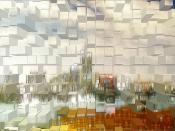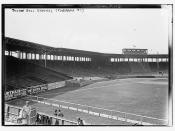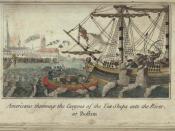(British)
Proclamation of 1763
Once the Native Americans retreated after Pontiac's Rebellion, the British issued the Proclamation of 1763, which forbade colonists to settle west of the Appalachian Mts.
(Colonist)
Proclamation of 1763
The colonists were angry about the proclamation. They thought that they had won the right to settle the Ohio River Valley. The British government was angry with the colonists, who did not want to pay for their own defense.
(British)
Sugar Act
In 1764, parliament passed the Sugar Act. This law placed a tax on sugar, molasses, and other products shipped directly to the colonies. It also called for strict enforcement of the act and harsh punishment for smugglers.
(Colonist)
Sugar Act
Colonial merchants, who often traded in smuggled goods, reacted with anger. Colonial leaders, such as James Otis claimed that Parliament had no right to tax the colonies, since the colonies were not represented in Parliament.
(British)
Quartering Act
King George III wanted to enforce the proclamation and also keep peace with their allies. They decided to keep 10,000 soldiers in the colonies. This required the colonists to house British soldiers and provide them with supplies.
The British owed a large debt from the F&I War. The British needed more income to pay off the debt. So they had the colonies pay part of the war debt and contribute toward the cost of frontier defense and colonial govt.
(British)
Stamp Act
In 1765, Parliament passed the Stamp Act. This required all legal and commercial documents to carry an official stamp showing that the tax had been paid. All wills, diplomas, contracts, published materials such as newspapers had to have a stamp on them.
(Colonist)
Stamp Act
The stamp act was different from other taxes for the colonies. The stamp act affected all colonists. The colonists had...



American Revolution
This is quite detailed. It's a great help as I am a History student, studying the American Revolution (and I am not American.) Great work! Definitely a good source of research.
2 out of 2 people found this comment useful.